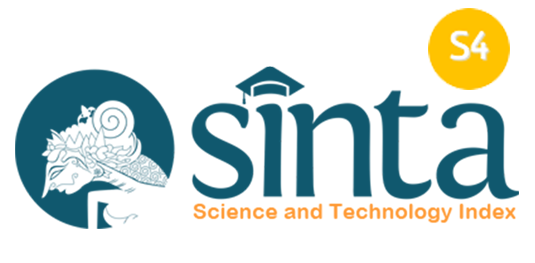Application Of Adobe Flash Multimedia In Improving Vocabulary Ability Of Student With Hearing Impairment
Abstract
This research is motivated by the empirical condition of vocabulary skills shown by deaf students at the State B Garut Special School, Indonesia, which is still small and under the minimum completeness criteria (KKM). The purpose of this study is to improve the vocabulary skills of students with hearing impairment through the application of adobe flash multimedia according to the level of ability or competence of students in the vocabulary aspect. The method was qualitative and quantitative descriptive analysis data processing techniques. The results showed an increase in learning behavior after applying adobe flash multimedia as a medium in improving the vocabulary skills of students with hearing impairment. This is evident from the average vocabulary acquisition results in each cycle and can be seen from the graph which tends to increase. The average percentage of vocabulary proficiency results in the first cycle was 80%, in the second cycle is increased to 88.33%, and in the third cycle, it increased again to 93%, so that it surpassed the predetermined standard KKM of 66. This study shows that the use of adobe flash multimedia can improve students' vocabulary skills. The use of adobe flash multimedia is very interesting and fun for students both in terms of images, audio, and moving animations. In addition, adobe flash multimedia can make it easier for teachers to guide students, especially for students with hearing impairment.
Keywords
Full Text:
PDFReferences
Aguselly, D. (2019). Efforts to increase vocabulary through snakes and ladders game in students with hearing impairment. Areas of Research: Journal of Multidisciplinary Research and Development, 2(1), 58-66.
Agustin, I. (2019). Implementation of Identification, Assessment and Learning for Children with Special Needs in Elementary Schools Providing Inclusive Education. EduStream: Journal of Basic Education, 3(2), 72-80.
Ariyona, C. B., and Damri, D. (2019). Improving vocabulary through pop up book media for class i students with hearing impairment at SLB Luak Nan Bungsu Payakumbuh. Journal of Special Needs Education Research, 7(1), 198-202.
Bergeron, F., Berland, A., Demers, D., and Gobeil, S. (2020). Contemporary speech and oral language care for deaf and hard-of-hearing children using hearing devices. Journal of Clinical Medicine, 9(2), 1-15.
Irdandi, A., Nasution, H., and Sukamto, A. S. (2017). Multimedia application design for sign language recognition for deaf children based on android. Journal of Information Systems and Technology, 5(4), 241-246.
Kadir, R. (2021). Improving the vocabulary mastery of students with hearing impairment through picture media for fourth grade students at SLB Negeri Gorontalo City. Aksara: Journal of Non-formal Education, 7(3), 1185-1192.
Nikolawatin, Z., Setyosari, P., and Ulfa, S. (2019). development of sign language tutorial media for deaf students SLB BC kepanjen. Journal of Innovation and Learning Technology, 6(1), 15-22.
Nurfadilah, N., and Nurhastuti, N. (2018). Total communication video learning media to improve vocabulary mastery for deaf children. Journal of Special Education Research, 6(2), 230-237.
Pertiwi, R. A. (2018). The Development of pop up book media to improve vocabulary in the junior high school levels of the dewi children in slb dewi sartika taman Sidoarjo. Journal of Educational Technology Students, 9(2).
Septiawati, D., Suryani, N., and Widyastono, H. (2021). the use of educational games against the vocabulary ability of deaf children. In Combines-Conference on Management, Business, Innovation, Education and Social Sciences, 1(1), 246-257.
Trimo. (2012) School management for inclusive education providers: an applicative study the importance of respecting diversity for children with special needs. Journal of Educational Management (JMP), 1(2), 224–239.
DOI: https://doi.org/10.17509/jassi.v21i2.39519
Refbacks
- There are currently no refbacks.
Copyright (c) 1970 Universitas Pendidikan Indonesia

This work is licensed under a Creative Commons Attribution-ShareAlike 4.0 International License.




